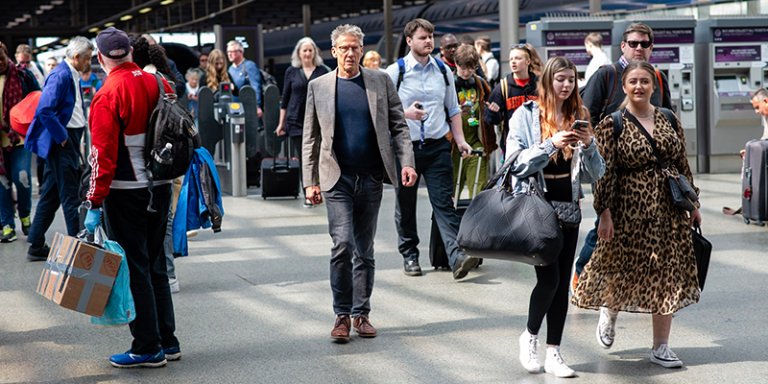Context and consequences: getting policy right for refugees
19 September 2024
James Baggaley sits down with Professor Christian Dustmann to discuss the intended outcomes and unintended consequences of refugee policies

James Baggaley
You have spent many years investigating the economics of migration and the ways in which refugees can be effectively integrated into new societies. One of the countries that you studied closely is Denmark. What have you learned from that?
Christian Dustmann
Denmark experienced significant refugee migration in the 1990s and 2000s, and refugees came from countries of no dissimilar origin to those coming to Britain today. My colleagues and I studied a large reform programme called “StartAid” which was implemented in 2002. It cut the benefit transfers to refugees who got refugee status after the reform’s implementation date by up to 50%. That reform intended to incentivise refugees to work and integrate into the labour market. We did see an increase in labor force participation, looking at those the reform directly impacted. However, overall, that increase only affected some individuals and was pretty short-lived. We hypothesised that one reason was a lack of demand for the type of lowskilled work refugees could supply. To test that, we utilised the fact that refugees were quasi-randomly allocated across municipalities. We found indeed that the reform was more effective in municipalities where demand for unskilled labour was higher. So, what do we learn from that? Reforms that are intended to incentivize labor supply are only effective if there is a demand for the type of work the target individuals can offer. This, we believe, is an important insight beyond the particular reform we have studied.
We also studied the effect the reform had on other family members, in particular, children of affected refugees. We found that crime increased, particularly among women, and here, especially subsistence crime such as shoplifting. We also found that crime among teenage children increased significantly in the longer term. Within the first five years, crime rates of refugees affected by the reform rose by five percentage points for adults and 12 percentage points for juveniles. Among school-age children at the time of reform exposure, the lower transfer rates reduced their average educational attainment by six months, driven by increased school drop-out rates at ages 16 and 17, where many children instead took up work to supplement family income. In the longer run, the lower educational attainment of children resulted in significant reductions in labour earnings. The reform also led to lower test scores among younger children, and lower pre-school enrolment and self-rated well-being. Overall, we find that 15-16 years after the implementation, the reform had generated a negative return for the average refugee family.
What do we learn from all that? StartAid failed to sustain employment and self-sufficiency, particularly in municipalities where low-skilled work is in low demand. Moreover, welfare reforms to increase labour supply through reduced transfer payments can have unintended and detrimental consequences for children. In our study, these adverse effects on children’s education, labour market performance, and crime rates outweigh, in the longer run, the short-term gains from increasing the labour supply of their parents.
James Baggaley
I think one of the things that struck me is that it is a great example of where you’ve seen fairly simplistic political arguments come into contact with the complexity of the real world.
Christian Dustmann
So that’s a very good way to phrase it. Many policies and implementations focus on the intended outcomes and ignore potentially unintended consequences.
James Baggaley
Are there examples from Denmark or other countries where they have understood this complexity and responded effectively in making refugee policy? What are the important measures that help integrate refugees?
Christian Dustmann
the decision about whether to grant asylum or not has to be made as soon as possible. Moreover, genuine assistance to integration is vital. Many countries don’t allow asylum seekers to work, and that leads to alienation from the labor market. Research shows we want the decisions on whether to grant asylum to be made as soon as possible. If then the courts sustain the refugee claim, we want refugees to integrate into the labour market and the wider community. This needs support - further education, help to transfer existing skills, providing support to acquire language proficiency are important support measures. The labour market is the best integrator, and refugees should be supported to find work as soon as possible.
Many countries allocate refugees randomly to areas, to equally distribute the burden of providing housing, etc. But you really want to encourage refugees to go where the jobs are, especially the jobs they can do or want to do. Our work shows that the economic outcomes of refugees who have been allocated to areas with more of the type of jobs they can actually do are much better than when they have been allocated to areas where these jobs are in sparse supply.
If we look at the demand side, it’s important to work together with employers to bring refugees into work and to use their skills. This is particularly important in institutionalized labor markets, like Germany, where many jobs require certifications, such as apprenticeship training. Refugees often have the training that is needed but lack the certificates. The role of policy, together with employers, is to find ways where these skills can be easily transferred to the host country’s labor market.
And then, of course, many things can be done at the community level to help people find jobs, integrate, and be part of the community
 Close
Close

